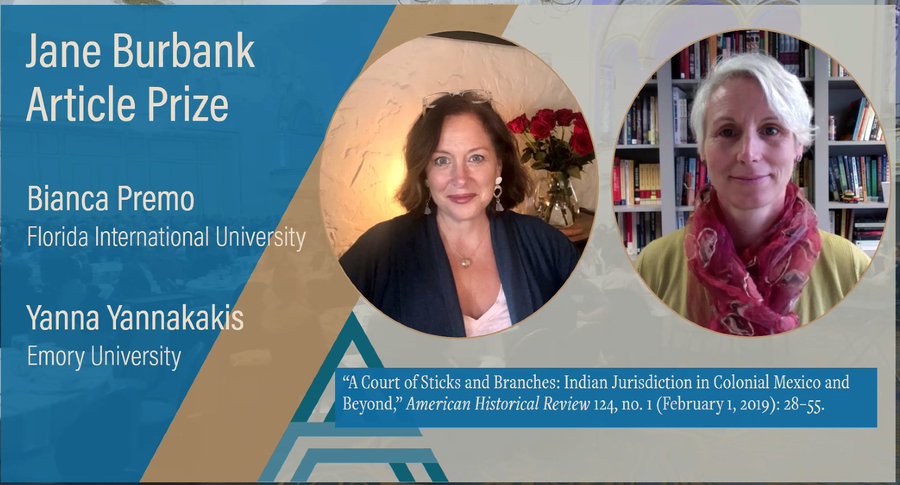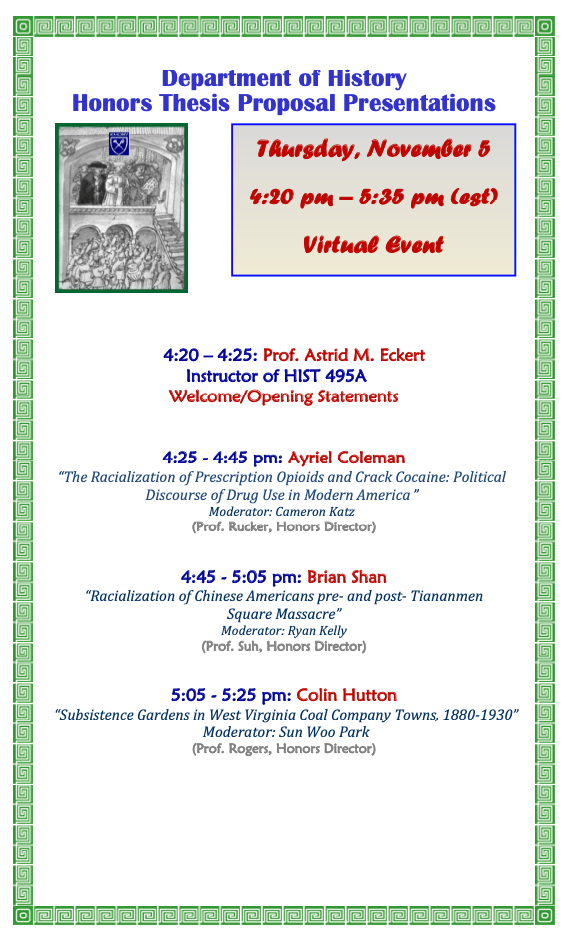Dr. Yanna Yannakakis, 2018-2021 Winship Distinguished Research Professorship in History and Associate Professor, recently contributed to a collaborative article in the American Society for Legal History’s The Docket. Yannakakis’s piece, “Legal Performances in the Boundary Lands: Violence, Objects, and Indigenous Claims in Colonial Mexico,” is one of five contributions to a broader article titled “The Everyday Materials of Colonial Legal Spaces.” That article includes a piece by Yannakakis’s frequent collaborator, Dr. Bianca Premo (Florida International University). Read more via the links below as well as at The Docket.
Category / Research
‘Emory Report’ Highlights Recent Honors Won by Eckert and Strocchia
The Emory News Center recently featured honors won by two History Department faculty members. The article highlights Associate Professor Astrid M. Eckert‘s West Germany and the Iron Curtain: Economy, Culture & Environment in the Borderlands (Oxford UP, 2019), which has won awards from the Central European History Society, the German Studies Association, and the European History Section of the Southern Historical Association. In addition, the Emory Report highlights Professor Sharon Strocchia‘s Forgotten Healers: Women and the Pursuit of Health in Late Renaissance Italy, which was awarded the Marraro Prize by the Society for Italian Historical Studies. Read about other faculty and staff awards from across the Emory campus: “Acclaim: Recent honors for Emory faculty and staff.”
Emory News Center Features ‘Slave Voyages’ Digital Memorial
The Emory News Center recently featured the Slave Voyages project among initiatives at Emory making an impact. The article discusses the expansion and updating of the digital memorial over the last few years, including through a $300,000 grant from the Mellon Foundation in 2018. Initiated by Dr. David Eltis, Robert W. Woodruff Professor Emeritus, Emory faculty and alumni – including Alex Borucki (PhD, 2011), Daniel Domingues da Silva (PhD, 2011), Jane Hooper (PhD, 2010), Nafees Khan (PhD, 2013), and Allen Tullos (Professor and Co-Director of Emory Center for Digital Scholarship) – continue to constitute the core of the Voyages team. Read the full article here: “Documenting Slave Voyages.”
Lesser to Speak on “Cultures in Movement” for ‘University in Transformation’ Lecture Series
Dr. Jeffrey Lesser, Samuel Candler Dobbs Professor of History and Director of the Halle Institute for Global Research and Learning, will present a talk entitled “Cultures in Movement: Expanding Virtual Methods of Research” (Culturas em movimento: Ampliando as pesquisas em modos virtuais) for a lecture series organized by the University in Transformation (Universidade em Transformação). Lesser will discuss virtual approaches he employs in his research as well as his current major project on health, immigration, and environment in the Bom Retiro neighborhood of the city of São Paulo, Brazil. Read more about the event (in Portuguese) here.
Graduate Student Alexander Compton Wins Article Prize from Southern Historical Association
Congratulations to graduate student Alexander Compton, whose second-year research paper “Decolonize Your Minds! Audre Lorde, Archival Activism, and the Transnational Origins of Black European Consciousness” won the John L. Snell Memorial Prize of the European History Section of the Southern Historical Association. The Snell Prize is given annually to the graduate student who submits the best seminar research paper in European history, written within the past year. Compton’s paper historicizes the processes that led to the rise of Black German and Black European consciousness in the 1980s, particularly the transnational networks forged through the composition, publication, and translation of the seminal Black German feminist anthology Farbe bekennen (Showing Our Colors). The paper was mentored by Prof. Eckert and Prof. Vick.
Yannakakis and Premo Win American Society for Legal History Article Prize

Congratulations to Dr. Yanna Yannakakis, 2018-2021 Winship Distinguished Research Professorship in History and Associate Professor, on winning an article prize with co-author Dr. Bianca Premo (Florida International University). The American Society for Legal History awarded their 2019 American Historical Review article, “A Court of Stick and Branches: Indian Jurisdiction in Colonial Mexico and Beyond,” with the Jane Burbank Article Prize. The prize is awarded annually to the best article in regional, global, imperial, comparative, or transnational legal history.
American Society for Ethnohistory Recognizes 2019 ‘AHR’ Article by Yannakakis and Premo
The American Society for Ethnohistory recognized an article co-written by Drs. Yanna Yannakakis and Bianca Premo (Florida International University) with honorable mention for the the Robert F. Heizer Award. The article, titled “A Court of Stick and Branches: Indian Jurisdiction in Colonial Mexico and Beyond,” was published in the February 2019 issue of the American Historical Review. Read more about the prize here.
Webster Wins 2019-’20 Francis S. Benjamin Prize

Congratulations to History graduate student Anjuli Webster on winning the 2019-20 Francis S. Benjamin prize for her paper, “From extraction to enclosure: Delagoa Bay as aqueous borderland in the nineteenth century.” The paper traces the history of failed British claims to Portuguese Delagoa Bay in south Eastern Africa over the nineteenth century. Through disputes over geography, jurisdiction, and possession of this imperial outpost, the border between what would become Mozambique and South Africa slowly and episodically coalesced long before the territorial carve up of Africa during the Berlin Conference of 1884.
The Benjamin prize was established in early 1974 in memory of Francis Benjamin who taught at Emory from 1946 till 1973. This gift is used to reward the best paper written by a graduate student during their first two years in the Emory History PhD program. View previous winners of the prize here.
Dr. Claudia Kreklau (18G) a Featured Speaker at Emory 2020 Homecoming

Emory’s 2020 Homecoming virtual program featured 2018 History PhD alumna Claudia Kreklau, currently Associate Lecturer in the School of History at the University of St. Andrews. Kreklau spoke as a part of the program “A Taste of Emory from Around the World,” which was organized by Emory International Advancement and Constituent Engagement. Dr. Brian Vick advised Kreklau’s dissertation, titled “‘Eat as the King Eats’: Making the Middle Class through Food, Foodways, and Food Discourses in Nineteenth-Century Germany.” Read more about the Homecoming program below and watch Dr. Kreklau’s presentation (Emory credentials required) here.
Take an exciting journey around the world to learn about the fascinating work of three international alumni working in the food and beverage industry. Discover how Jamie Koh 07B founded Singapore’s first stand-alone, micro-distillery for gin. Hear how Digant Kapoor 10Ox 12C is helping to expand sustainable farming in Dubai. And, learn the unique history of food from Claudia Kreklau 16G 18G.
Coleman, Shan, and Hutton Present Undergraduate Honors Thesis Proposals
Please join us this coming Thursday, November 5, at 4:20pm to learn about the latest history honors research projects. Three undergraduates, Ayriel Coleman, Brian Shan, and Colin Hutton, will present their work on the history of drug use in America, the racialization of Chinese Americans, and gardening in West Virginia coal mining towns. If you have not received the zoom link via email, please contact Prof. Eckert at aeckert [at] emory [dot] edu
